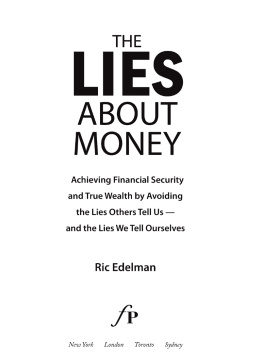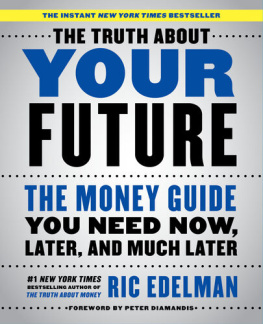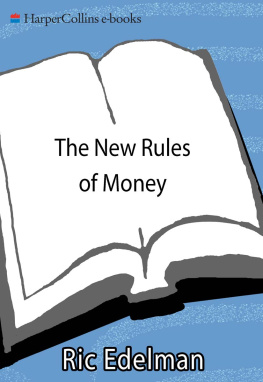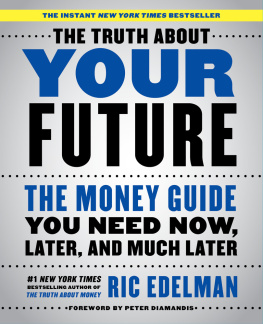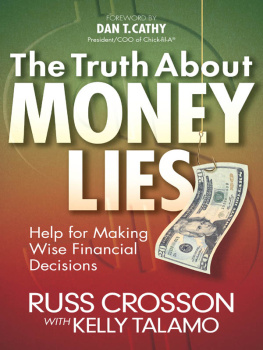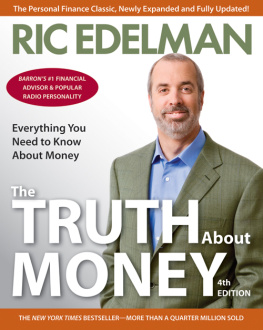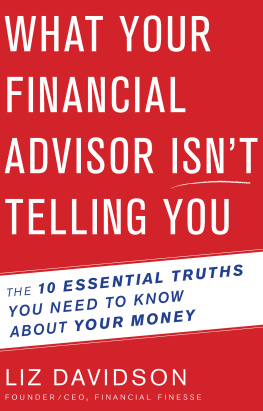Thank you for purchasing this Free Press eBook.
Sign up for our newsletter and receive special offers, access to bonus content, and info on the latest new releases and other great eBooks from Free Press and Simon & Schuster.

or visit us online to sign up at
eBookNews.SimonandSchuster.com
We hope you enjoyed reading this Free Press eBook.
Sign up for our newsletter and receive special offers, access to bonus content, and info on the latest new releases and other great eBooks from Free Press and Simon & Schuster.

or visit us online to sign up at
eBookNews.SimonandSchuster.com
What about home ownership? Home ownership is typically not a long-term goal. If you don't already own a home, it's either not a goal or you want to buy one as soon as possible. Thus, the investment strategies for home ownership are not the same as those for college and retirement. To learn how to buy a home, read Part 8 of The Truth About Money.
Oh boy! Bet you can't wait!
I also told him to marry up. Okay, that was a little glib.
Go ahead, tell your kids, Sorry you won't be able to go to college. But tonight we're watching HBO!
It's true: A pack and a latte each costs $5. You need to earn $7.14 to spend those five bucks, assuming a 30% combined federal and state tax bracket. If you instead invested that money in a retirement plan for your forty-year career, earning 10% per year, you'd accumulate $2,792,084.
They also found that slimmer people get bigger inheritances. They speculate that slimmer people live longer and thus are more likely to receive inheritances. They also hypothesize the possibility of discrimination within families.
Don't accelerate the payoff of mortgages, car loans, or student debt; simply make those monthly payments on time. But do get rid of your credit card debt as soon as possible. To learn how, read chapter 51 of The Truth About Money. Sorry for all the references to TAM, but it's either that or reprint those chapters here.
To learn how, read What You Need to Do Now. (At least I didn't reference TAM.)
You can't. Indexes are not real investments but a theoretical portfolio of specific securities common examples are the S&P, the Dow Jones Industrial Average (DJIA), NASDAQ the performance of which is often used as a benchmark in judging the relative performance of certain asset classes and market sectors. Indexes are unmanaged portfolios, and investors cannot invest directly in an index. Past performance is not indicative of future results. You can, though, invest in mutual funds designed to replicate the holdings of an index, so it's sort of the same thing. But the NASD says that I have to insert sentences two, three, and four whenever I talk about the S&P 500 or any other index.
See footnote 9.
See footnote 9.
See footn enough already!
If you think this doesn't sound like much, consider that after twenty years, the woman who earns 12% per year on a $100,000 account will accumulate $291,879 more than a man who earns 10% per year.
Stock Market Extremes and Portfolio Performance by H. Nejat Seyhun, 1994; A Nonparametric Test of Market Timing by Wei Jang, 2003; and Sequential Optimal Portfolio Performance: Market and Volatility Timing, by Michael Johannes, Nicholas Polson, and Jon Stroud, 2002.
I've written about dozens of others in my earlier books, as well as in my monthly newsletter.
Of course, you might not want to reallocate back to your original model. Changes in your circumstances could warrant a change in your asset allocation. But that's quite different from saying you'd never want to rebalance.
Actually, you shouldn't have to pay costs for rebalancing. Our clients, for example, pay no such fees.
But you knew that, right?
And when I say consistently, I mean it: Maintain the same interval for decades, regardless of current events or market activity.
lf you really want to know why, invite some statisticians over for dinner; they'd love to explain it to you.
I mean genius literally. Standard deviation was first described by Karl Pearson (18571936), who founded the world's first university statistics department, at University College London. Albert Einstein said Pearson's book The Grammar of Science is the first book a scientist should read. Many of the book's themes became a part of Einstein's theories.
I explained standard deviation in The Truth About Money and Discover the Wealth Within You, so I'll spare you the drudgery here. I mean, this chapter is already ugly enough. Let's move on.
Like I said, the guy was a genius.
That's almost! Not always!
Which I explained in The Truth About Money.
Oops. Sorry for the jargon. Systematic risk refers to the overall risks of the stock market; unsystematic risk refers to the risks of investing in the stock of a specific company.
Dr. Sharpe has noted that no one calls his formula by its proper name, the Reward-to-Variability Ratio. In a 1994 paper published in the Journal of Portfolio Management, he noted that his ratio has been called the Sharpe index (Radcliff, 1990, and Haugen, 1993), the Sharpe measure (Bodie, Kane, and Marcus, 1993; Elton and Gruber, 1991; and Reilly, 1989), the Sharpe ratio (Morningstar, 1993), and various other names. Hey, Bill, a rose is a rose.
Some might challenge this statement, arguing that the latest step along the continuing evolution of portfolio management belongs to lower partial moment, developed in 1975. But LPM has yet to make its way out of academia.
Graham deserves attention; he's the guy who taught Warren Buffett how to invest.
This example refers to the five hundred stocks of the S&P 500 Stock Index. An equally valid example could be used with the Wilshire 5000. In other words, do not take this example to necessarily mean that you should buy mutual funds that mimic the S&P 500 index. More on this in chapter 5.
I mean, you don't have to understand the principles of internal combustion, but your auto mechanic sure does.
And successful salespeople at that. The average stockbroker earned an average of $125,112 in 2006, according to Broker Dealer magazine.
Of which my firm is one.
Technically, the Dogs theory refers to highest-yielding stocks, not worst-performing. But the result is pretty much the same: A high-yielding stock, by definition, features a high stock-to-dividend ratio. That ratio is high because the price is low, and the only way for the price to be low is for that stock to have performed worse than the other stocks. (This also explains why the theory is so stupid. Instead of increasing the stock price which is what the Dogs followers hope will happen the company could instead simply cut the dividend. It often happens, leaving investors in the, uh, doghouse.)
in December 2006, and which appeared on YouTube in March 2007, Cramer said that he manipulated stock prices in his earlier career as a trader. He said he spread rumors about stocks and felt his actions were safe because the SEC never understands this. He added, What's important when you are in hedge fund mode... is to not do anything remotely truthful because the truth is so against your view that it's important to create a new truth, to develop a fiction. Cramer has since recanted, saying he did not do any of these things when he ran a hedge fund, nor did he believe what he said. But investors are left to wonder if they can ever believe anything he says.
I've surely left off some deserving names; please consider that an error and not necessarily a commentary.
Next page
